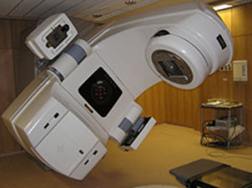Researchers Develop Computer Simulation to Help Improve Radiation Therapy for Cancer Patients
By MedImaging International staff writers
Posted on 22 Mar 2015
A project to develop more effective radiation therapy treatments is underway. Posted on 22 Mar 2015
The research was initiated at the University of Arkansas (Fayetteville, AR, USA) and further developed at the Sam M. Walton College of Business (Fayetteville, AR, USA). The study was published in the March issue of the Journal of Applied Clinical Medical Physics.

Image: A linear accelerator used for radiation therapy (Photo courtesy of University of Arkansas).
The researchers used repeated-sampling algorithms to develop a computer simulator that created customized electron beams using dual-foil scattering systems for radiation therapy. Linear accelerators create concentrated electron beams that destroy cancerous tumor cells, without damaging surrounding healthy tissue.
The simulations allow the user to rapidly design and optimize dual-scattering foil systems to improve cancer treatment, by varying primary and secondary scattering foil material and thickness.
Justin LeBlanc, doctoral fellow and researcher at the Sam M. Walton College of Business, said, "The user user-friendly interface and real-time nature of the simulator also make it an effective educational tool for gaining a better understanding of the effects that various system parameters have on dose profiles. In other words, it will help medical physicists and linear accelerator designers to better understand the physics behind the equipment with which they will be working."
Related Links:
University of Arkansas
Sam M. Walton College of Business














